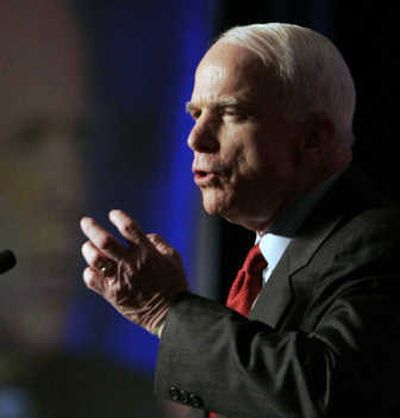McCain advocates robust foreign policy for U.S.

WASHINGTON – One thing is clear about John McCain’s foreign policy views: Much like his political heroes Ronald Reagan and Theodore Roosevelt, he believes that America’s power is a force to make the world better.
How McCain would wield that power as president is less clear, however.
The Arizona senator, now the presumptive Republican presidential nominee, is a leading supporter of President Bush’s troop “surge” in Iraq – a stance that some observers credit with reviving his political fortunes as security in Iraq has improved, at least temporarily.
Less well known are McCain’s promises, if elected, to expand the Army and the Marine Corps to 900,000 soldiers and Marines from a planned strength of about 750,000; to form a U.S.-led League of Democracies to act when the United Nations can’t or won’t; and to form a new government unit, patterned after the World War II-era Office of Strategic Services, “to fight terrorist subversion” and “take risks that our bureaucracies today rarely consider taking.”
McCain’s foreign-policy advisers are a mix of traditional Republican “realists,” who favor a pragmatic approach to the world, and “neoconservatives,” who lobbied for the Iraq invasion, advocate tougher action to squelch Iran’s and North Korea’s nuclear weapons ambitions and favor using U.S. power to transform the Muslim world.
McCain has broken with his party on some key issues. He’s taken a more lenient stance on immigration, expressed greater concern about global climate change and opposed the Bush White House on the Guantanamo Bay prison and the use of interrogation techniques that could be considered torture.
“I think he’s a very interesting mix,” said Gary Samore, who served in the Clinton White House and is now vice president of the nonpartisan Council on Foreign Relations.
On issues such as climate change and immigration, McCain would be “very different from the Bush administration,” Samore said. “On other issues, he’s been very bellicose,” he added, citing Iran and North Korea.
McCain already has indicated that he plans to use national security as a cudgel against the eventual Democratic nominee in the general election campaign.
In Norfolk, Va., on Friday, he talked tough on Iran and said he’s best prepared to deal with security threats on his first day in office.
Democratic candidates Sens. Hillary Clinton and Barack Obama “want to set a date for withdrawal in Iraq. I believe that would have catastrophic consequences. They (terrorists) would try to follow us home,” McCain said.
But McCain hasn’t spelled out in detail yet how he’d deal with threats to America’s security.
Would he keep tens of thousands of U.S. troops in Iraq if the situation there stagnates or grows worse? Would he follow through on threats to attack Iran if it appears close to obtaining a nuclear weapon? How would he deal with instability in nuclear-armed Pakistan? Or an increasingly competitive China and an increasingly combative Russia?
McCain’s advisers are reluctant to criticize President Bush, even in private. But they suggest that while their candidate agrees with many current White House policies, he’s critical of how they’ve been implemented.
Unlike Bush, McCain would come to the Oval Office with combat experience, years of studying national security issues and extensive foreign travel.
His advisers dispute the notion that McCain, a former Navy pilot who was a prisoner of war in North Vietnam, would be quick to order the U.S. military into action.
McCain is willing to “use military force when necessary as a last resort,” said Randy Scheunemann, the campaign’s director of foreign policy and national security. But the senator also believes the war on terrorism “is a war of ideas,” he said.
McCain has promised to increase funds for public diplomacy and to launch a “crash program” to teach more soldiers and civilians critical foreign languages.
The campaign hasn’t spelled out where McCain would find the billions of dollars it would take to recruit and train 150,000 additional soldiers and Marines.
“Obviously, it’s going to cost more money to recruit people, and it’s going to take some time,” Scheunemann said. Considering the current strains on U.S. military forces, McCain “reached a conclusion (that) you’ve got to increase the size.”
McCain’s foreign-policy team is sprinkled with people, including Scheunemann, who were ardent backers of the 2003 Iraq invasion and who dismissed critics who warned of unintended consequences. They include former CIA Director James Woolsey, an adviser mostly on energy security, and William Kristol, the editor of the conservative Weekly Standard.
McCain himself was an early booster of Iraqi exile Ahmad Chalabi, whose Iraqi National Congress provided bogus prewar intelligence on Iraq’s weapons of mass destruction and ties to terrorism.
At a January town hall in New Hampshire, McCain told a questioner that it “would be fine with me” if the United States had a military presence in Iraq for 100 years. He stressed that he meant a peacetime presence like that of U.S. troops in Germany and Japan.
Scheunemann pointed out that McCain has been endorsed by top officials from every recent Republican administration. He said McCain has “united the foreign-policy wings of the Republican Party.”
But McCain’s views on the use of U.S. military power have shifted over time.
As a freshman GOP congressman in 1983, he drew national media attention for opposing President Ronald Reagan’s extension of the U.S. Marine deployment in Lebanon.
He said in a speech on the House of Representatives floor: “The longer we stay in Lebanon, the harder it will be for us to leave. We will be trapped by the case we make for having our troops there in the first place.”
But in the last dozen years, McCain has supported U.S. interventions in Bosnia, Kosovo, the 1991 Gulf War and Iraq.
Samore said that, whatever McCain’s instincts, he’ll be restrained from new interventions by the wars in Iraq and Afghanistan. “Bush has overdrawn the bank account on use of force for the time being,” he said.